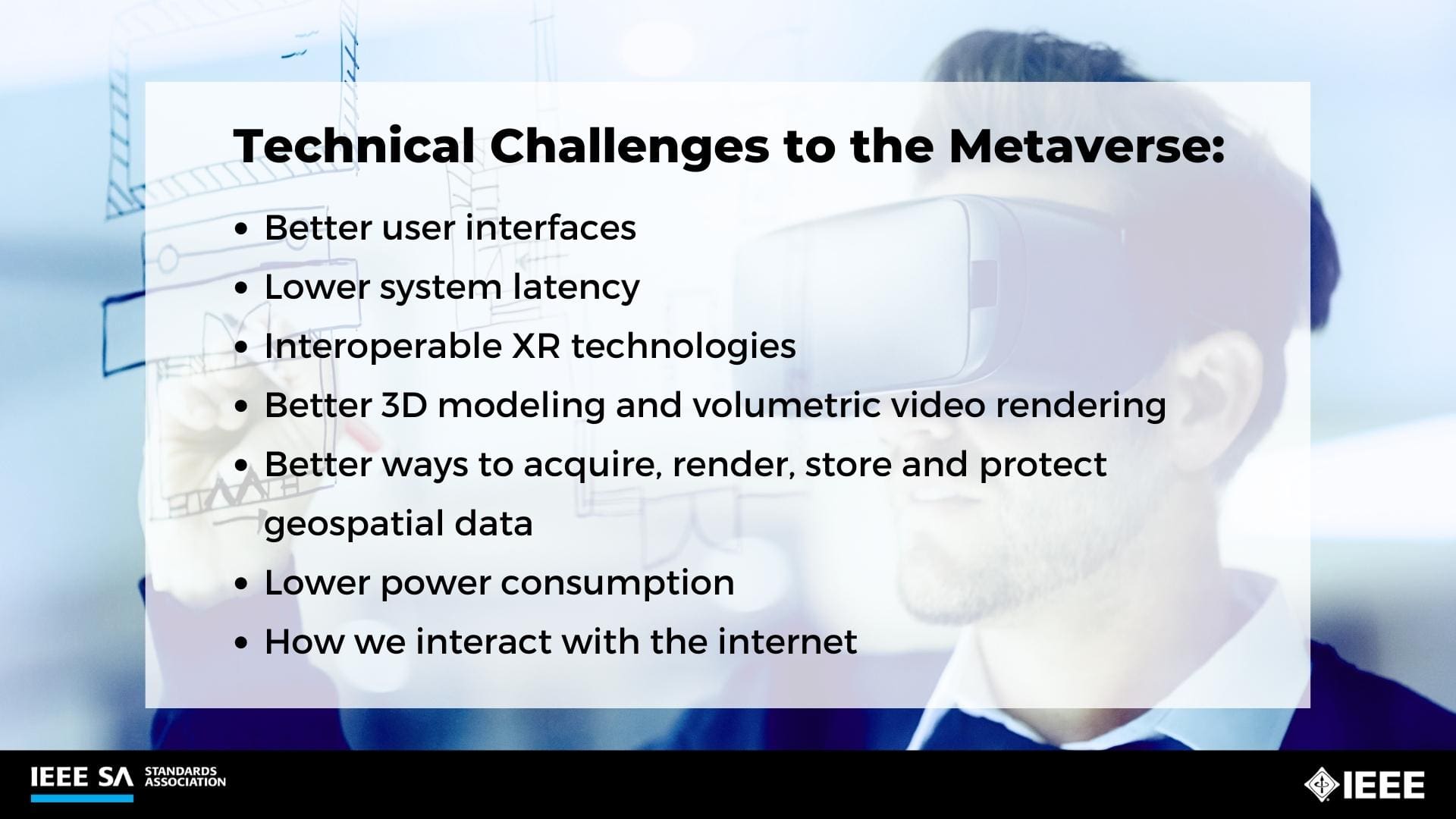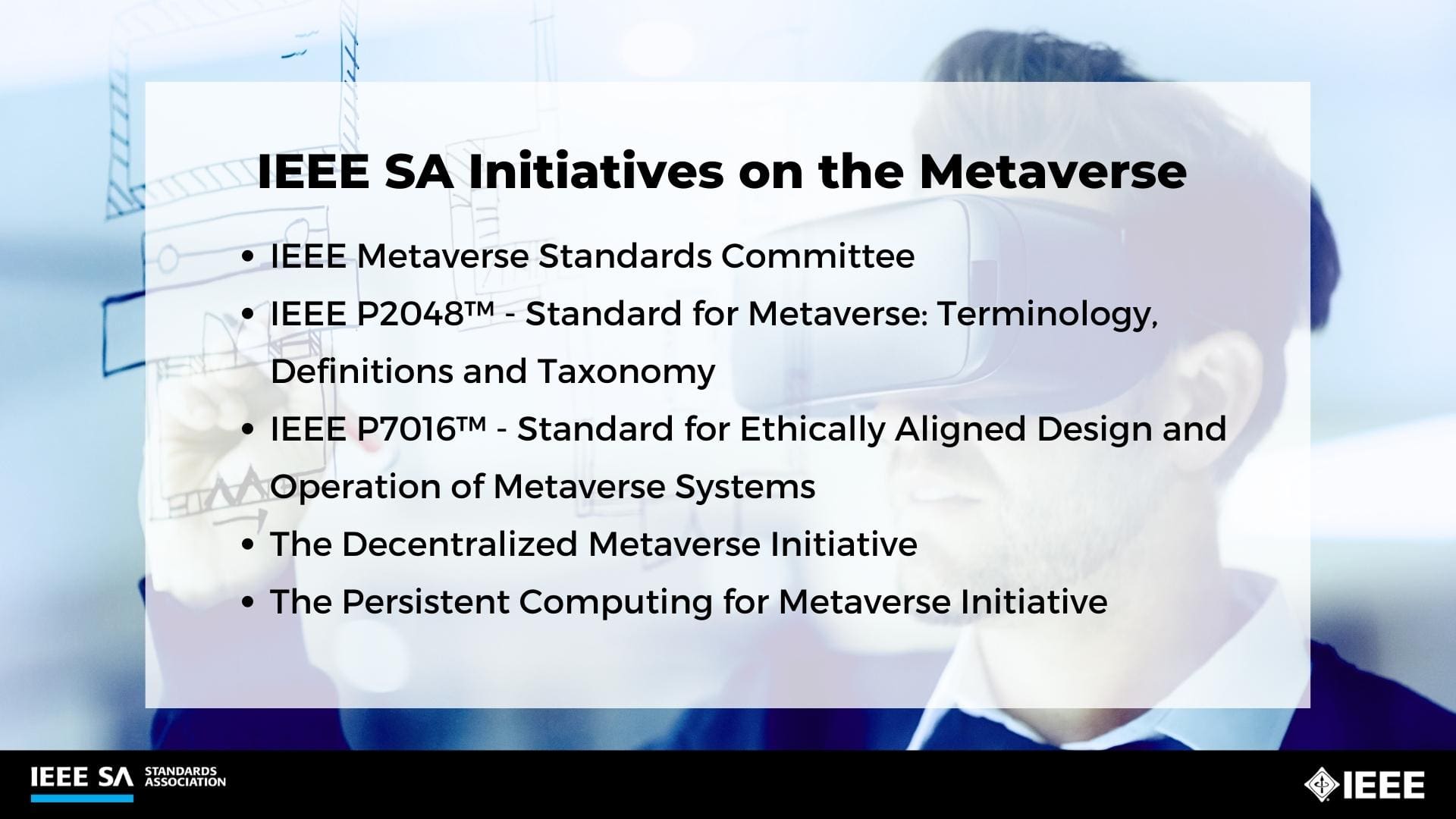Highlights:
- Designing and building metaverse environments come with many challenges, from technical issues to socio-technical considerations.
- IEEE SA is at the forefront of developing a range of standards and resources, to help turn metaverse concepts into practical realities, and drive new markets.
- Join our Metaverse Community today to help advance the metaverse technology and applications.
What Does Metaverse Mean?
We increasingly hear the term “metaverse,” but what does it really mean, and how will it be used?
Some say it refers to an expanded set of digital worlds that will grow out of the digital environments with which we are already familiar, such as those used for online gaming. In this view, the metaverse will be an enhanced extended reality (XR) experience. It will offer new features and capabilities that will accelerate the digital transformation of society and enhance sustainability, by reducing the need for people to travel and perform resource-intensive activities in the physical world.
Others take a different view. Their view of the metaverse is that it should be a decentralized ecosystem that empowers users to create digital assets of their own choosing and engage in digital commerce. According to this definition, because the metaverse architecture would be open, decentralized, and without gatekeepers, it would serve to democratize the internet by making it transparent, accessible, and interoperable to everyone.
Although both of these viewpoints are based on the idea that a metaverse enables virtual interactions in real-time, clearly, the metaverse concept means different things to different people. But however it may evolve, one thing is for certain: the metaverse has tremendous potential to fundamentally transform the ways we work, learn, play, and live our lives.
What are the Key Challenges to the Metaverse?
Designing and building metaverse environments also come with many challenges, ranging from technical issues to socio-technical considerations.
Technical challenges to the metaverse include:
- Better user interfaces
- Lower system latency
- More tightly integrated, interoperable XR technologies
- Better 3D modeling and volumetric video rendering
- Better ways to acquire, render, store and protect geospatial data
- Lower power consumption
- How we interact with the internet
With regard to socio-technical challenges, a consensus is needed to address the wide variety of views held on issues such as user identity and credentialing, privacy, openness, ethics, accessibility, and user safety.
That is why IEEE Standards Association (IEEE SA) is at the forefront of developing a sweeping range of metaverse-related standards and resources for stakeholders, who include device and technology developers, service providers, metaverse designers, content creators, academics, government agencies, and others. The overarching goal is to define, develop, and deploy the technologies, applications, and governance practices needed to help turn metaverse concepts into practical realities, and drive new markets.

Building on Existing Technologies and Evolving into New Applications
By its nature, the metaverse is a collective space that converges many diverse technologies into new applications. As the world’s leading standards development organization, IEEE SA is uniquely positioned to lead the standardization efforts required to meet evolving needs of new markets and applications, given its broad and deep range of experience with the necessary technologies. To mention a few examples:
- Connectivity – A metaverse could not exist without IEEE standards for connectivity. IEEE SA’s Connectivity and Telecom Practice gathers global stakeholders from the industry and academia to address the need for robust and sustainable connectivity. In addition, the IEEE 802® family of local area network technical standards, for example, is fundamental to implementing wired and wireless communications.
- Augmented reality (AR) – Augmented reality is likely to be a key type of the metaverse, and existing IEEE standards are directly relevant. For example, IEEE 1589™ Standard for Augmented Reality Learning Experience Model, details an overarching integrated conceptual model, along with data specifications, on how to represent activities, the learning context, the specific environment, and potentially other components needed for AR-enhanced learning activities, in a standardized interchange format. It lowers entry barriers for users who need to create learning experiences that integrate real-world interactions using sensors and computer vision, with web applications.
- Metaverse-related human factors – As people engage more deeply with immersive experiences, how to make those experiences seem more “real” and to alleviate physical effects such as motion sickness become increasingly important. The IEEE 3079 Working Group on Human Factors for Immersive Content, for example, has initiated several standards development projects to help address these issues.
- Ethical guidelines – The metaverse will offer powerful new capabilities, and ethical guidelines are needed from the outset to design and use them appropriately. A series of white papers by IEEE SA explores the impact of XR on user privacy, safety, identity, and inclusion, and its ethical implications on education, medicine, finance, and other areas. The work has also led to the development of IEEE P7030™, a recommended practice for the ethical assessment of XR technologies.
- Hyperspace Transaction Protocol (HSTP) – Advances in data computation, particularly in the cyber-physical realm, are in urgent need of interoperability among disparate hardware and software systems, as well as trust, privacy, and security between human and digital systems. The IEEE P2874™ standard project was created to provide this much-needed protocol.
Driving Future Directions - IEEE Metaverse Standards Committee
To continue to serve the shifting marketing needs, IEEE has recently established the Metaverse Standards Committee (CTS/MSC) to develop and maintain standards, recommended practices, and guides for the metaverse. This Standards Committee replaces the former Virtual Reality and Augmented Reality Standards Committee and is the first committee in major SDOs worldwide that focuses on advancing metaverse-related technologies and applications.
Along with the formation of this Standards Committee are two pioneering standards and two Industry Connections (IC) activities to incubate new ideas on metaverse topics of great interest to industry.
Pioneering IEEE Standards for the Metaverse
IEEE SA’s two new standards projects for the metaverse are the first from any major global standards development organization. One addresses the need to provide a consistent vocabulary and a clear roadmap for metaverse developers, while the other deals with ethical considerations for the design and operation of metaverse systems.
- IEEE P2048™ – Standard for Metaverse: Terminology, Definitions and Taxonomy. Right now the metaverse industry is in its infancy and there is much hype, confusion, and misunderstanding about it. The lack of consensus even on basic terminology, definitions, and taxonomy not only can mislead early adopters, but can also create unnecessary barriers to advancement. IEEE P2048 will define the vocabulary, categories, and levels of a metaverse in order to establish a common ground for ongoing discussions, facilitate the sustainable development of metaverse-related activities, and promote the healthy growth of metaverse markets.
- IEEE P7016™ – Standard for Ethically Aligned Design and Operation of Metaverse Systems. This standard will provide a high-level overview of the techno-social aspects of metaverse systems, and specify an ethical assessment methodology for use in their design and operation. It guides metaverse developers on how to adapt their processes to prioritize ethically aligned design of their systems; defines ethical system content with regard to accessibility and functional safety; and provides guidance on how to promote ethically aligned values and robust public engagement in the research, implementation, and proliferation of metaverse systems, in order to increase human well-being and environmental sustainability.
New Industry Connections (IC) Activities for the Metaverse
IEEE SA’s Industry Connections (IC) program is designed to incubate new standards and related products and services for rapidly developing technologies such as the metaverse. The program facilitates collaboration and consensus-building among participants. It provides them with IEEE resources used to produce deliverables such as standards proposals; white papers and reports; events; databases and registration services; software tools and web services; among others.
IEEE SA has recently launched two new IC activities specifically for the metaverse.
- The Decentralized Metaverse Initiative is aimed at developing the economic and governance infrastructure for decentralized metaverses. The goal of this work is to develop and provide guidelines for implementing decentralized metaverses, which not only could capitalize on intellectual property and virtual assets in decentralized ways, but also could benefit from other potential features of decentralized architectures.
- The Persistent Computing for Metaverse Initiative addresses the similarities and differences between VR and a metaverse. Many VR experiences are one-time occurrences, such as in a game. But a metaverse requires consistency and persistence, and to achieve it, various technologies are required to build, operate, and upgrade metaverse experiences. These include but aren’t limited to computation, storage, communications, data structures, artificial intelligence (AI), and so forth. This IC will facilitate discussions and collaborations on persistent computing; steer and advise on metaverse research and development; and provide technical guidelines and reference implementations for persistent virtual worlds and metaverse.
Join IEEE SA in Advancing the Metaverse
The metaverse has the potential to be one of the most significant technological developments in human history. But to realize its potential, it needs the talents and experience of technology developers, software experts, device manufacturers, academic researchers, and many others.

IEEE SA’s metaverse-related activities are expanding rapidly. The IEEE Metaverse Congress, a series of webinars launched by the IEEE SA Foundational Technologies Practice, aims to provide a global and comprehensive view of the Metaverse with experts who are involved with metaverse technology development, design, governance, and other aspects.
We invite you to get involved to help develop this exciting new area, advance your organization’s viewpoint, and engage with others who, like you, want to take part in something big and meaningful for the world. Join our Metaverse Community today.
Authors:
- Yu Yuan, IEEE SA President-Elect
- Srikanth Chandrasekaran, IEEE SA Foundational Technologies Practice Lead

